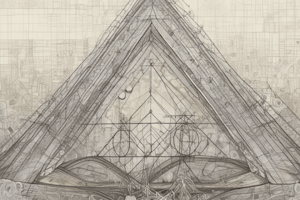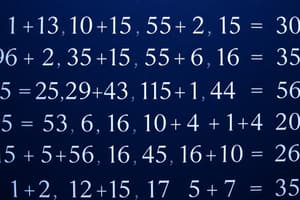Podcast
Questions and Answers
What is a common property of whole numbers and rational numbers?
What is a common property of whole numbers and rational numbers?
- Distributive property
- Commutative property
- Closure property
- All of the above (correct)
The result of adding two whole numbers is always a rational number.
The result of adding two whole numbers is always a rational number.
False (B)
What is the formula to calculate the percentage increase of a value?
What is the formula to calculate the percentage increase of a value?
Original value × (Percentage increase / 100)
A fraction can be expressed as a ______________ number.
A fraction can be expressed as a ______________ number.
Match the following types of numbers with their definitions:
Match the following types of numbers with their definitions:
What is the result of multiplying two whole numbers?
What is the result of multiplying two whole numbers?
The order of rational numbers changes the result of addition.
The order of rational numbers changes the result of addition.
What is the formula to calculate the percentage decrease of a value?
What is the formula to calculate the percentage decrease of a value?
A decimal number can be converted to a ______________ by dividing the numerator by the denominator.
A decimal number can be converted to a ______________ by dividing the numerator by the denominator.
What is the result of dividing two rational numbers?
What is the result of dividing two rational numbers?
Flashcards are hidden until you start studying
Study Notes
Whole Numbers
- A set of positive integers, including 0, without fractions or decimals
- Examples: 0, 1, 2, 3, ...
- Properties:
- Closure: The result of adding or multiplying whole numbers is always a whole number
- Commutative: The order of whole numbers does not change the result of addition or multiplication
- Associative: The order in which whole numbers are added or multiplied does not change the result
- Distributive: Multiplication distributes over addition
Rational Numbers
- A set of numbers that can be expressed as the ratio of two integers (fractions)
- Examples: 3/4, 22/7, 1/2
- Properties:
- Closure: The result of adding, subtracting, multiplying, or dividing rational numbers is always a rational number
- Commutative: The order of rational numbers does not change the result of addition or multiplication
- Associative: The order in which rational numbers are added or multiplied does not change the result
- Distributive: Multiplication distributes over addition
Percentages
- A way to express a value as a fraction of 100
- Examples: 25%, 50%, 75%
- Calculating percentages:
- Increase: Original value × (Percentage increase / 100)
- Decrease: Original value × (100 - Percentage decrease) / 100
- Percentage change: ((New value - Original value) / Original value) × 100
Fractions
- A way to express a part of a whole as a ratio of two integers
- Examples: 1/2, 3/4, 2/3
- Operations with fractions:
- Addition: Add numerators, keep denominators the same
- Subtraction: Subtract numerators, keep denominators the same
- Multiplication: Multiply numerators and denominators separately
- Division: Invert and multiply
Decimals
- A way to express a fraction as a base-10 number
- Examples: 0.5, 0.25, 1.75
- Converting between decimals and fractions:
- Decimal to fraction: Divide numerator by denominator
- Fraction to decimal: Divide numerator by denominator and simplify
Whole Numbers
- A set of positive integers including 0, without fractions or decimals
- Examples: 0, 1, 2, 3, ...
- Properties:
- Closure: Addition and multiplication of whole numbers always result in whole numbers
- Commutative: Order of whole numbers does not affect addition and multiplication results
- Associative: Order of whole numbers in addition and multiplication does not affect results
- Distributive: Multiplication distributes over addition
Rational Numbers
- A set of numbers that can be expressed as the ratio of two integers (fractions)
- Examples: 3/4, 22/7, 1/2
- Properties:
- Closure: Operations on rational numbers result in rational numbers
- Commutative: Order of rational numbers does not affect addition and multiplication results
- Associative: Order of rational numbers in addition and multiplication does not affect results
- Distributive: Multiplication distributes over addition
Percentages
- A way to express a value as a fraction of 100
- Examples: 25%, 50%, 75%
- Calculating percentages:
- Increase: Original value × (Percentage increase / 100)
- Decrease: Original value × (100 - Percentage decrease) / 100
- Percentage change: ((New value - Original value) / Original value) × 100
Fractions
- A way to express a part of a whole as a ratio of two integers
- Examples: 1/2, 3/4, 2/3
- Operations with fractions:
- Addition: Add numerators, keep denominators the same
- Subtraction: Subtract numerators, keep denominators the same
- Multiplication: Multiply numerators and denominators separately
- Division: Invert and multiply
Decimals
- A way to express a fraction as a base-10 number
- Examples: 0.5, 0.25, 1.75
- Converting between decimals and fractions:
- Decimal to fraction: Divide numerator by denominator
- Fraction to decimal: Divide numerator by denominator and simplify
Studying That Suits You
Use AI to generate personalized quizzes and flashcards to suit your learning preferences.




